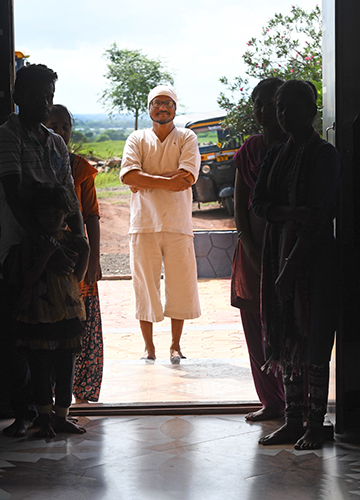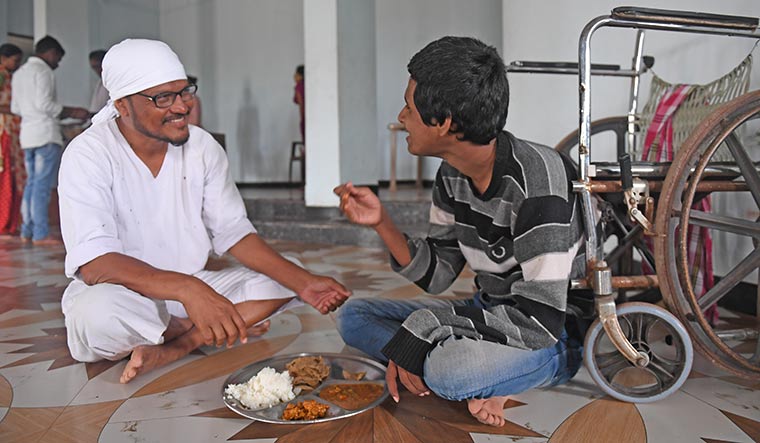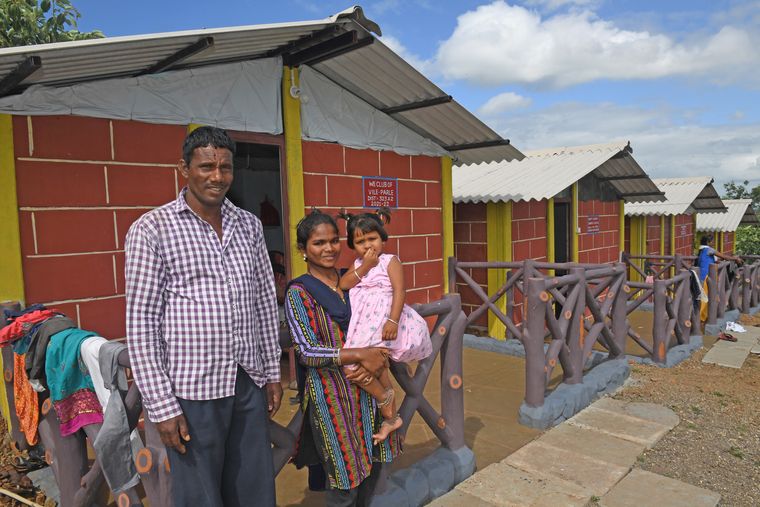Some events in life can shake you to the core. They can make you feel so sick about the society you are in that you start wondering how people can be so inhuman, uncaring and unconcerned. That is how Ravi Bapatle felt in 2006 when he witnessed the shocking death of a seven-year-old HIV-positive orphan who was abandoned by a village in Latur district.
Ever since his parents had died of AIDS, the boy had been living alone in a hut outside the village; the villagers treated him as an outcast. The boy died alone in that hut. “Nobody was willing to perform his last rites,” said Bapatle, 47, founder of Latur’s Happy Indian Village and Sevalay. “His body started rotting and stinking. That is when I called my friends and we performed the boy’s last rites.”
Back then Bapatle was a journalist with a local Marathi newspaper and was teaching journalism at a college in Latur. A couple of months after witnessing the apathy of the villagers, Bapatle devoted his life to the welfare of HIV-positive orphans. He resigned from both his jobs, informed his parents about his decision and told them that he would remain single as he was not sure of finding a partner who shared his vision. “My parents opposed my decision,” Bapatle told THE WEEK. “They tried reasoning with me. But I left our home in Udgir taluk, came to Latur and started living with my elder brother. I had made up my mind.”
In 2007, Bapatle came to Hasegaon, a village 25km from Latur, with a six-year-old Shahaji Shinde. He spoke to his friends about his decision to set up a community for HIV positive orphans. They welcomed it. Manmathappa Mukta, grandfather of his friend Shanteshwar Mukta, donated six and a half acres. “The help from Manmathappa was a godsend,” said Bapatle. “With his support and blessing, I was able to start Sevalay, our first residential facility. Back then, it was just a big hut.”
When Bapatle went to the village panchayat to apply for an electricity connection, he was refused one. “The village panchayat told me that they will not allow HIV orphans to live in the village and I will not get any NoCs for Sevalay’s needs like water and electricity,” he said.
Bapatle then met Latur district collector Eknath Dawle, who told the state electricity board to provide the connection immediately. After he got electricity and water, Bapatle built unpaved roads, small huts and a big hall. For a year, he and Shahaji were alone. “Shahaji is the first HIV-positive boy who came to me,” he said. “He was five-six years old when his mother put him in my care. She was suffering from AIDS and died a few years later. Soon the word spread and HIV-positive children began coming to Sevalay from the Marathwada region.”
When the number of children grew, Bapatle decided to admit them in the zilla parishad school at Hasegaon. The villagers feared that “his children” would spread HIV among the other children. “They shut down the school for almost two months,” he said. “Politicians exploited the situation. Local MLA Dinakar Mane demanded that Sevalay be shut down immediately. A team from MSACS (Maharashtra State AIDS Control Society) rushed to Hasegaon. Then, the villagers conducted a poll to decide whether to admit our children into the school and allow Sevalay to continue. Except the family that donated land, the entire village voted against me. Even BJP MLC Pasha Patel opposed strongly.”
Bapatle approached each family in the village to create awareness about how the disease spreads. “I went to villagers and told them that my children will not infect anyone,” he said. “[That] HIV does not spread in this manner. ‘If you find that my children have infected anyone, you are free to hang me in the village square.’” It worked. Barring one influential family, almost everyone in the village agreed to allow Bapatle’s kids at school. “So, now the kids go to school in the village and then they go to Latur for college,” he said.
College admissions were not easy either. In fact, Bapatle had to launch indefinite fasts two or three times to force the college administrations to pay heed. His ‘satyagraha’ won and colleges admitted his kids into their classrooms and hostels. But, Bapatle was not done yet. He began working to secure five per cent reservation in government hostels for HIV-positive children. That battle, too, was soon won.
“My biggest worry was where will the kids go after they turn 18,” he said. “Because you can keep kids in a children’s home only till they turn 18, as per rules. So we needed a facility, a shelter for our children who had turned 18, as they were still not confident that society would accept them. So far, the needs like education, food and clothing were being met through the funds received from donations. But that money was not enough to build accommodation for those who had become adults.”
So he formed a cultural troupe of Sevalay kids, which performed songs, ballads and a one-act play. The first show was received well. “We did more than 100 shows,” he said. “Toured Karnataka, Goa and Gujarat. The response was encouraging and we raised almost Rs1.5 crore to buy additional land near Sevalay.”
Bapatle began buying small parcels of land from 2014. By 2016, he had more than 15 acres, which he thought was sufficient to set up a community for HIV-positive orphans. He built separate hostels for girls and boys and a common community hall for meetings as well as dining. He also constructed cottages, for married HIV-positive couples who joined the community, which he had named Happy Indian Village. In 2017, Sevalay shifted completely to the new campus. “Today, we use (the old campus) for various educational courses that we teach our orphans and HIV-negative orphans who come to us for education,” he said. “We train tailors, beauticians, mechanics and drivers for earth-movers.”
The community now has 80 orphans and five couples. “The babies born to these couples are thankfully HIV negative as we follow a regimen that includes medicines, nutrition and exercise,” said Bapatle. Apart from the five couples who stay at Happy Indian Village, Bapatle has, so far, arranged the weddings of 11 HIV-positive couples. As the children under his care became adults, a need was felt to get them married to willing HIV-positive partners. He also began receiving marriage proposals for some girls in his care from HIV-positive men. HIV-positive girls under his care have married men in Karnataka, Solapur, Pune and are leading happy lives. “Earlier, the lifespan of HIV-positive children used to be 15-20 years,” he said. “But, with advances in medicine, the life span has increased. Similarly, latest medicines also ensure that babies born to HIV-positive couples are HIV negative. So, these couples are looking forward to life again. They know that their children can be negative even if they are positive.”
Happy Indian Village has a lake that can store 1.5 crore litres of water. This lake was conceptualised by Bapatle in order to take care of water supply during Latur’s harsh summers, when the mercury crosses 40 degrees Celsius. The community has also planted a wide variety of trees to take care of their fruit needs. The trees have been destroyed many times by a group of Hasegaon villagers who continue to oppose him. “A couple of years ago, they destroyed almost 300 mango trees,” he said. “In May, they attacked me with weapons. A case was filed and some of them went to prison. As for me, I am ready to die for these orphans.”
IAS officer Abhinav Goel, who is CEO of Latur zilla parishad, told THE WEEK that his team regularly interacts with Bapatle. “Our effort is to help this institution in every possible way,” he said. “So, whenever they come to us with any issue or grievance we look into it immediately.”
Another IAS officer who had helped Bapatle in the initial years of his initiative said that Bapatle’s work has helped greatly in removing stigma around HIV in Latur. “He faced lot of stiff opposition, but does not harbour any ill will towards those who harassed him as he knows that it will only damage his work in the long run,” said the IAS officer, who requested anonymity. “In the initial days of the project, when he was harassed almost on a weekly basis, we had asked if he wanted to register a complaint against anyone. But, he declined and merely said he will continue doing his work and that people will eventually see the point.”
All that Bapatle wishes for his children is that they grow up to lead a meaningful and dignified life. Vidya Kakade, a girl who has completed her diploma in beauty therapy and tailoring courses, came to Bapatle’s institution when she was 12. The government authorities closed down an institution named Jeevan Rekha in Parbhani as its work was not satisfactory and sent all 13 HIV-positive kids there to Bapatle. Vidya was among them. “I was born HIV positive and my parents succumbed to the disease,” she said. “I have been here eight years now. I have completed a diploma course and also a beautician’s course. I want to go to Pune and work there in a beauty parlour to gain experience. Eventually, I want to start my own parlour in Latur.” She understands that it will be a long road. “I know it is difficult,” said Vidya. “But, with baba (Bapatle) backing me, I will make it happen.”




